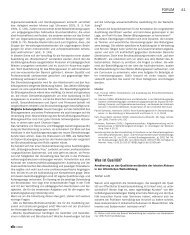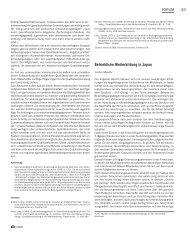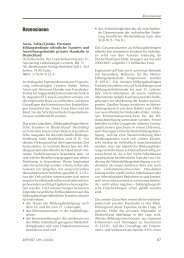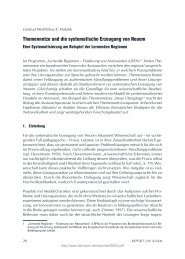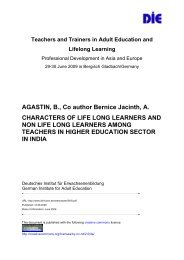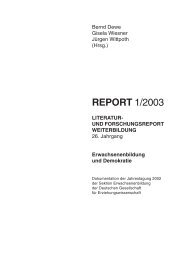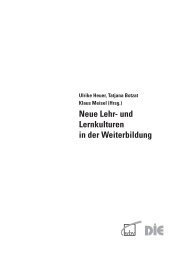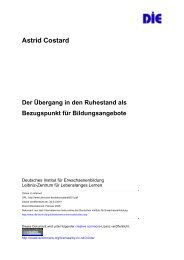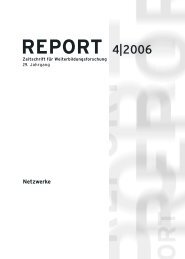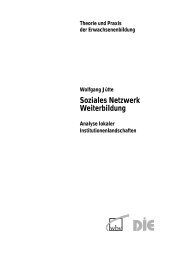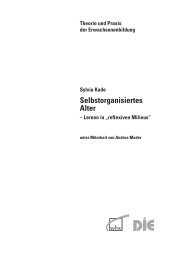Accreditation of Prior Experiential Learning (APEL)
Accreditation of Prior Experiential Learning (APEL)
Accreditation of Prior Experiential Learning (APEL)
Create successful ePaper yourself
Turn your PDF publications into a flip-book with our unique Google optimized e-Paper software.
and therefore firmly subordinated, forms <strong>of</strong> higher education – may become an anachronism<br />
in the new century” (Scott 2000, pp 41-42).<br />
Within a changing and diverse higher education system <strong>APEL</strong> serves as a tool for promoting<br />
greater flexibility in relation to access and entry, assessment and accreditation.<br />
<strong>APEL</strong> has the potential to open the door <strong>of</strong> universities to those previously denied<br />
access as a result <strong>of</strong> experiencing inequalities in initial education, and/or socio-economic<br />
structural constraints. One <strong>of</strong> the future scenarios <strong>of</strong> universities will be to provide<br />
a range <strong>of</strong> multi-level programmes to meet the needs <strong>of</strong> an adult learning population<br />
within a learning society. Higher education is no longer the preserve <strong>of</strong> the young<br />
as Heeger (1983, p 3) elaborates: “The very concept <strong>of</strong> prior learning is a recognition<br />
<strong>of</strong> the changing needs <strong>of</strong> an ageing population, which has been accumulating a far<br />
more complex learning background than higher education has had to deal with in the<br />
past.”<br />
Evidence from a TSER project on adult access to universities indicates that in many<br />
European countries the adult student population is growing to the extent that in some<br />
institutions adults now form the majority. In Sweden adult students have always been<br />
considered the norm, although not necessarily non-traditional. Yet despite the move<br />
towards mass higher education elite institutions still remain largely untouched across a<br />
Europe in which “the university system is used to privilege a small minority in an<br />
unequal contest for high social and economic status” (Bourgeois et al. 1999, p 27). The<br />
division between the traditional and new/reform universities may further entrench a<br />
two-tier system as pockets <strong>of</strong> resistance to change remain. Dichotomies between research<br />
and teaching, elite and diverse student populations (visible in the UK) may well<br />
mark the higher education system <strong>of</strong> the future. However, as the system as a whole<br />
responds to the transformation many institutions are opening their doors to local communities<br />
and non-traditional students, and will continue to do so in the future. New<br />
forms <strong>of</strong> knowledge production are emerging, <strong>APEL</strong> among them, which enable adults<br />
to access higher education which was previously denied them.<br />
3. What is <strong>APEL</strong>?<br />
The essence <strong>of</strong> <strong>APEL</strong>, recognising informal learning from experience, is not new but<br />
formalising it as a recognised means <strong>of</strong> entry and learning process is. <strong>APEL</strong> bridges the<br />
gap between formal and informal learning. <strong>Prior</strong> experiential learning is recognised by<br />
HE institutions in a number <strong>of</strong> ways: for admission, as accreditation, advanced standing<br />
and as part <strong>of</strong> the learning/teaching process. Generally <strong>APEL</strong> is most commonly<br />
used for admission and advanced standing. <strong>APEL</strong> is also closely linked to systems <strong>of</strong><br />
credit accumulation and transfer and the development <strong>of</strong> European economies (HEQC<br />
1998) with the potential to encourage mobility <strong>of</strong> learners and workers within and<br />
between nation states. Much literature assumes that the reader knows what <strong>APEL</strong> means.<br />
Definitions are few and far between. A number <strong>of</strong> acronyms are used to mean slightly<br />
57


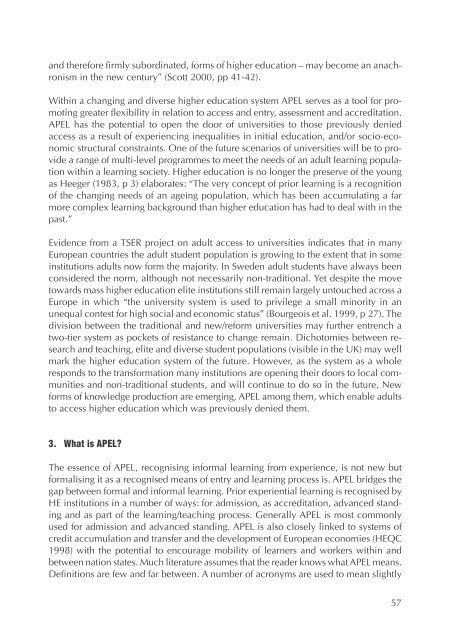
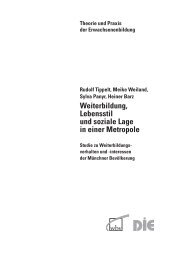
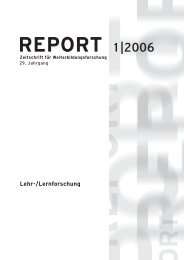
![PDF [KB 892] - Deutsches Institut für Erwachsenenbildung](https://img.yumpu.com/7495168/1/144x260/pdf-kb-892-deutsches-institut-fur-erwachsenenbildung.jpg?quality=85)
